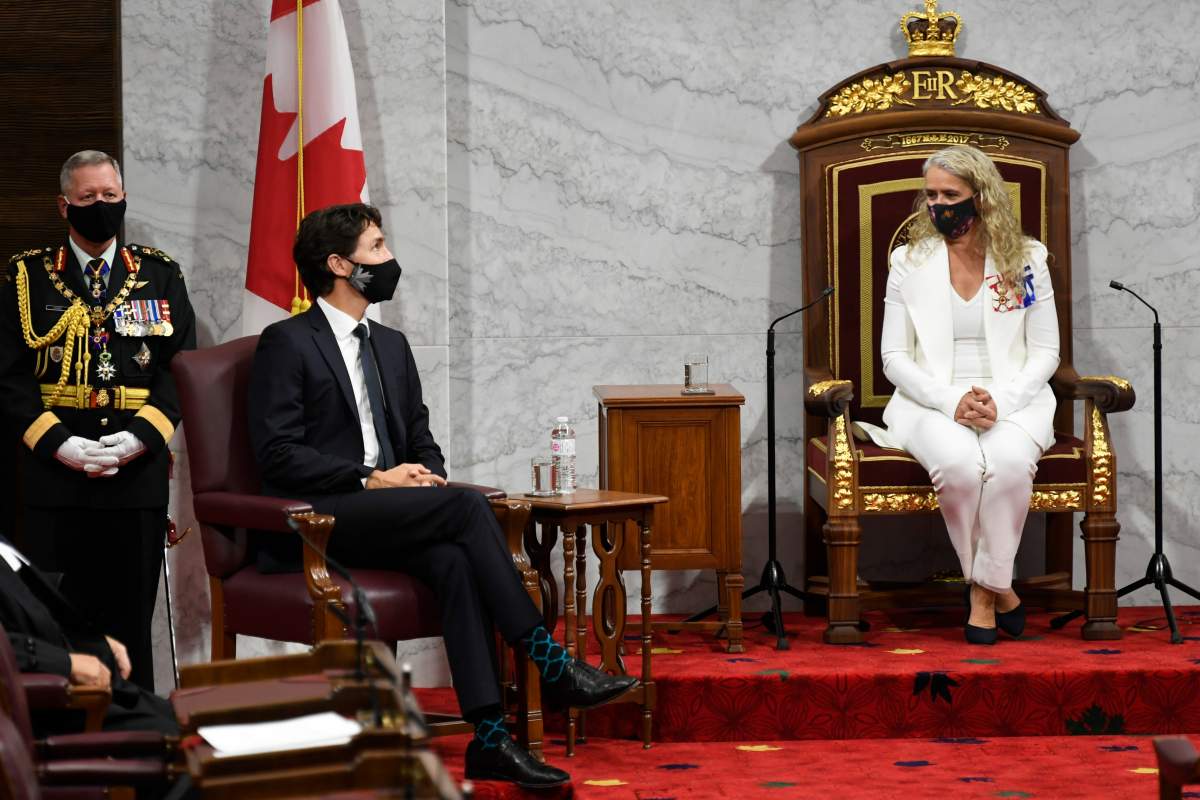The pageantry of last week’s almost surreal throne speech, and the subsequent televised address by Prime Minister Justin Trudeau, may have left Canada’s political classes with much to dissect and discuss.

Yet Canada’s women and moms were simply left rolling their eyes at a big theme in those speeches — that the pandemic has hit women worse than men, and most of all, those women with children.
READ MORE: Trudeau dangles national childcare system in throne speech with few hints of fiscal restraint
This is a disconnect that is causing women in general, and moms in particular, to feel disengaged and disillusioned. Many have little faith in our political leaders to make things better for them in any practical way, especially during the COVID-19 pandemic.
And it shows up in the numbers.
Ipsos recently asked Canadians which federal party leaders best fit the bill on a series of traits. Women were consistently more likely than men to say that none of our leaders could be described as best at anything, whether managing the COVID-19 crisis, steering the ship during tough economic times or taking action against climate change.
Most damning of all, nearly four in 10 women (37 per cent), including 38 per cent of moms, say that no major federal party leader’s values best represent their own (just 27 per cent of men feel the same).
Think about that for a moment: despite real progress made in female representation at the highest levels of elected office, many women simply don’t see themselves reflected in the leadership of this country.

Get daily National news
What they do see is another acute health-care crisis just around the corner. Women are significantly more pragmatic than men about a second wave of COVID-19: eight in 10 (81 per cent) expect a second wave to hit their community in the fall, compared to 71 per cent of men.
Moms, who are best placed to see what’s happening in schools, are even more likely to expect things to get worse: 84 per cent expect their community to be affected this fall.
READ MORE: 75% of Canadians approve of another coronavirus shutdown if second wave hits, Ipsos says
Women also see a good deal of personal risk, at a time when they are expected more than ever to be the glue that keeps their families together. Ipsos polling has shown for a long time that women tend to worry more about health issues than men, and that continues to be the case as this second wave gathers pace: 72 per cent of women (and 71 per cent of moms) are personally concerned they will catch the virus, compared to just over half of men (55 per cent).
It follows, then, that women are also more supportive of measures to curb the spread of COVID-19. If a second wave hits — and Prime Minister Trudeau confirmed last week that it is undeniably underway — women (80 per cent) are significantly more likely than men (71 per cent) to support shutting down most non-essential businesses quickly like we did in the spring.
Eight in 10 moms agree – particularly if doing so means avoiding the closure of schools again. Why shouldn’t they, when so many have so much at stake if we end up with a spiralling COVID-19 situation like the one playing out south of the border?

There are systemic reasons behind these sentiments.
COVID-19 is a bigger threat to women because of our increased chance of exposure: we are more likely to be front-line health-care workers, and more likely to be living in long-term care homes — one of the worst places to be during a pandemic, as we all saw to our horror in the spring.
Women’s financial health and housing security are more at risk because we are more likely to be in the precarious employment situations that led to more than three million jobs being lost around the country in the first two months of the pandemic alone.
At home, women are disproportionately at risk of gender-based violence from their partners, a situation exacerbated by punitive lockdown conditions.
When kids enter the picture, moms are the ones who tend to shoulder the child-care responsibilities, including decisions about education. From keeping them busy when schools closed early to debating the safety of sending them back in the fall, it’s been a tall order for the average mom, and the new school year is barely a month old.
In his address on Sept. 23, the prime minister said that “by creating a Canada-wide early learning and child-care system, we’ll ensure that kids have access to care, and that no parent, especially no mother, will have to put their career on hold.”
That’s a measure that will no doubt be welcomed by those who need it most.
Despite it, most Canadian women are still feeling stuck at the crossroads, unsure which way to turn.
Mitra Thompson is a senior account manager at Ipsos








Comments
Want to discuss? Please read our Commenting Policy first.